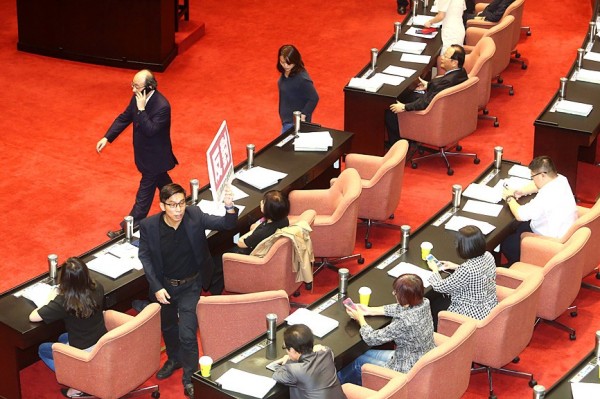《TAIPEI TIMES》 Act to block gangs from politics

Lawmakers vote on the draft of the new Political Party Act in the Legislative Yuan in Taipei yesterday. Photo: CNA
CONSENSUS: The KMT, PFP and DPP caucuses’ proposals to lower the threshold for a subsidy to political parties to 3 percent of the number of votes cast were passed
By Sean Lin / Staff reporter
The legislature yesterday passed the Political Party Act (政黨法), which lawmakers said would enable fairer competition between political parties and prevent criminal gangs from meddling in politics.
One of the act’s major articles lowers the threshold for political parties to receive government subsidies from 3.5 percent to 3 percent of the number of votes cast in the latest legislative election.
The New Power Party (NPP) had proposed to lower the threshold to 2 percent, with NPP caucus convener Hsu Yung-ming (徐永明) saying it would make for a more pluralistic political environment in which small parties can survive, despite not winning any seats in legislative elections.
Hsu said the public should not worry about the Chinese Unity Promotion Party (CUPP) receiving subsidies as a result of the passage of the act, as it and another party advocating unification with China passed the threshold long ago and have been receiving subsidies.
“We should not miss the point, which is to promote diversity and consolidate democracy,” he said.
The Chinese Nationalist Party (KMT) and the People First Party (PFP) had jointly tendered the motion to set the threshold at 3 percent.
KMT caucus secretary-general Lin Wei-chou (林為洲), citing subsidy rules in other nations, said that the two caucuses believed that setting the threshold at 3 percent would be more proportionate, as it would indicate that a political party has received sizable public support and therefore is worthy of receiving subsidies.
As the subsidies are paid using taxpayers’ money, the subsidized parties must have a sizable public support base, Democratic Progressive Party (DPP) Legislator Tsai Yi-yu (蔡易餘) said, adding that the DPP caucus believed it was appropriate to set the threshold at 3 percent.
As the motions proposed by the KMT, PFP and DPP on the subsidies had identical content, they were simultaneously passed.
The act also included an article that prohibits individuals convicted of offenses associated with organized crime from serving as leaders of political parties.
The article was created following discussions on gangsters working with the CUPP — founded by former Bamboo Union leader Chang An-le (張安樂), also known as the “White Wolf” — in a violent attack on students and protesters at the Sing! China: Shanghai-Taipei Music Festival at National Taiwan University in September.
The act stipulates that parties whose leaders have been convicted of offenses linked to organized crime must report to the Ministry of the Interior and elect a new leader within three months.
It also stipulates that the ministry should proactively order such parties to elect new leaders within a given timeframe after learning of the situation.
The rule also applies to people who have been convicted of treason or compromising national security, as well as those who face potential prison terms of 10 years or longer, a life sentence or the death penalty.
Political parties are to declare their assets with the ministry before May 31 each year, including income from membership fees, cash donations and revenue from selling merchandise.
The act stipulates that parties that fail to declare their assets or provide false information would face a maximum fine of NT$5 million (US$165,717), which could be issued repeatedly.
Political parties are to be banned from running or investing in for-profit organizations and from buying real estate other than its headquarters.
Contravening the rule could result in a fine of between NT$5 million and NT$25 million.
A provision of the act governing the dissolution of political parties authorizes the ministry to disband a party if it has not held a general assembly or nominated candidates for elections in four years.
It also stipulates that political parties formed under the Civil Associations Act (人民團體法) are to revise their articles of association within two years after the act’s promulgation or be disqualified and disbanded.
新聞來源:TAIPEI TIMES

















